Taking inspiration from ancient history and mythology, Kuunatic is a moon-worshipping Japanese trio creating a unique sonic universe in which psychedelic rock, different tribal sounds, and traditional Japanese music all blend. After releasing their first EP, Kuurandia, in 2017, they went on a UK tour and made a split album with Taiwanese band Crocodelia. Last October, German label Glitterbeat Records released Kuunatic’s first full-length album, Gate of Klüna, produced by a former member of Gang Gang Dance, Tim DeWit. The trio has been gaining recognition across the world ever since. They’ve just finished touring in the UK and EU, where they played at 30 venues in June and July.
To learn about the band and its history, concepts, international career, and album-making process, we spoke to Fumie (keyboardist and vocalist) in Taiwan, Yuko (drummer and vocalist) in Tokyo, and Shoko (bassist and vocalist) in London over Zoom.
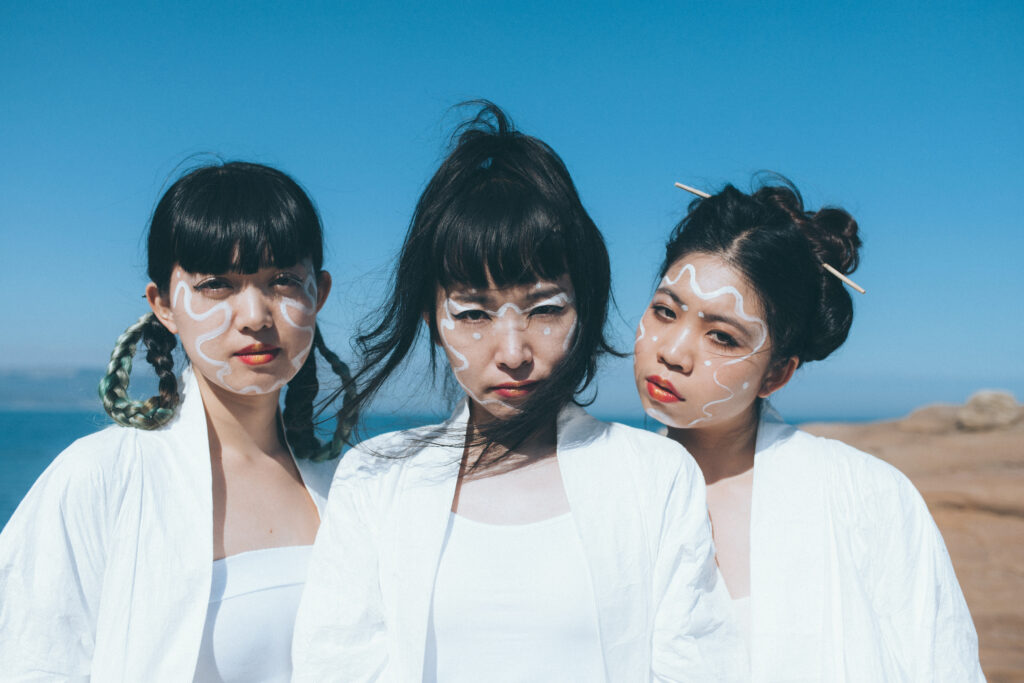
Creating a singular soundscape
–How was Kuunatic formed?
Yuko: Initially, Fumi-chan (Fumie) and our mutual friend Angie from Venezuela made music together, which eventually became Kuunatic. You made music in studios and such, yes?
Fumie: Yeah. Angie, Sanni from Finland, and I made music together here and there. Sanni had to return to Finland, so we started looking for a drummer. Angie introduced Yuko-san to me, and she began making music with us. That’s the beginning of Kuunatic.
–Was the predecessor of Kuunatic similar in terms of sound and theme?
Fumie: No, we jammed a lot but didn’t make music with a clear concept.
Yuko: We started wanting to mix tribal sounds and traditional Japanese music once we officially formed Kuunatic. Angie came to Japan as a study-abroad college student, and she was interested in Japanese culture. I was interested in her background as well as Venezuelan and Latin music. We began chatting about wanting to mix each other’s cultures in our music, like a fusion. I feel like our 2017 EP, Kuurandia reflects that strongly.
–Shoko-san, you joined the band after Kuurandia was released. What was that like in retrospect?
Shoko: I joined in 2017 before we went on tour in England. Angie left the band before it, and Yuko and Fumie approached me because they were like, “Oh no, do we know anyone?” I was a support musician on tour but became an official member afterward. And here we are today. I had never heard of the kind of music they made, and the way they used musical scales was distinct. I remember how it was so different.
–Your music incorporates various musical elements. What kind of musical background does each of you have?
Fumie: I used to take kagura (traditional Shinto music and dance) and traditional Japanese dance lessons. The Japanese flute I played for our songs is the one I used to use for kagura. Because of my background, I wanted to use elements and sensibilities of traditional Japanese music. I also love 60s psychedelic rock and prog rock music. Those genres shaped me a lot. I’m also a DJ who often plays music in that vein.
Yuko: I listen to a broad range of music. I love metal and hardcore music, but I also enjoy psychedelic rock and prog rock music. I like electronic music and dance music too. As I mentioned, I’m interested in music and cultures from various countries. So, I also listen to tribal-sounding music that doesn’t exist in the west.
–What about you, Shoko-san?
Shoko: My parents are classical orchestra musicians, so I grew up with that type of music. My father loves baroque music and forced me to listen to the genre during my childhood. I discovered rock and post-punk when I became older and listened to many different genres. But whenever I engage with music, it does remind me that my foundation is in baroque music. It follows me everywhere.
A special sentiment toward the moon
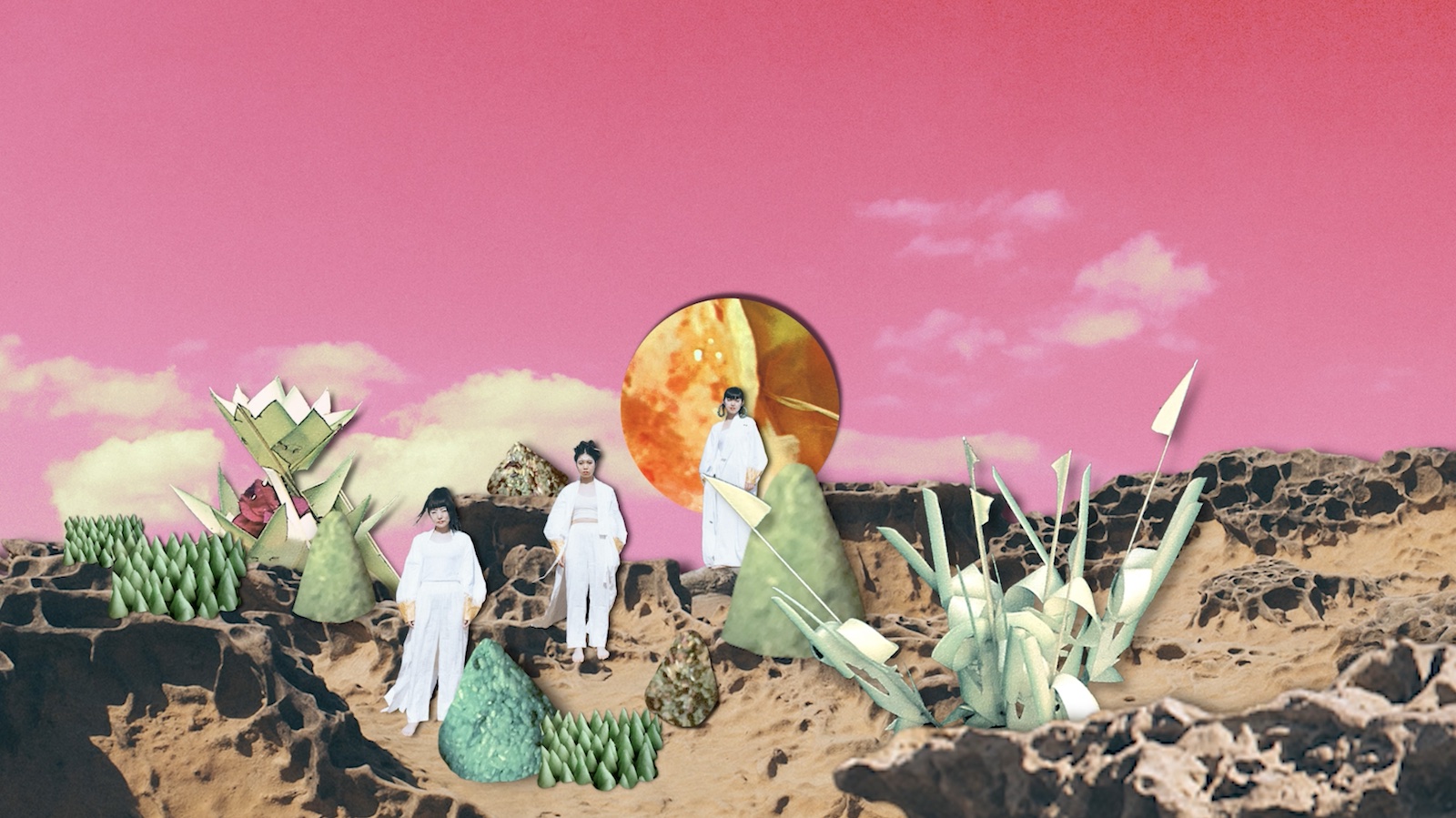
–Each of your diverse musical backgrounds contributes to the band’s unique sound. I’m assuming Kuunatic is a name you made up; what’s behind it?
Fumie: Kuu means moon in Finnish, and we combined that with lunatic because the root word is luna (moon). In this band, we all worship the moon. We’re attracted to how mysterious and beautiful it is, and we’re also interested in traditions and cultures related to the moon, like how it can induce elevated emotions and madness.
Yuko: We’re all been accustomed to the moon since birth, but it’s mysterious and magical partially because you can’t see the other side. It’s almost this mystical thing. I like that duality and mystery.
Shoko: I always look at the moon when it’s out, and I also feel its influence on my body, like how I can’t sleep at times because of its cycle. It’s also connected to my mental state. I feel like women are especially prone to be influenced by the ebb and flow of the moon. It’s quite a symbolic occurrence, but most of our live shows fall under a full moon.
–That’s amazing! You don’t schedule your shows on a full moon on purpose, do you?
Shoko: No, I feel like it’s coincidental.
Fumie: We beckon the moon, and it beckons us.
Yuko: Whenever we do something together, we casually talk about the moon like, “Tonight’s a full moon” or “There’s a new moon tonight.”
Building a career abroad
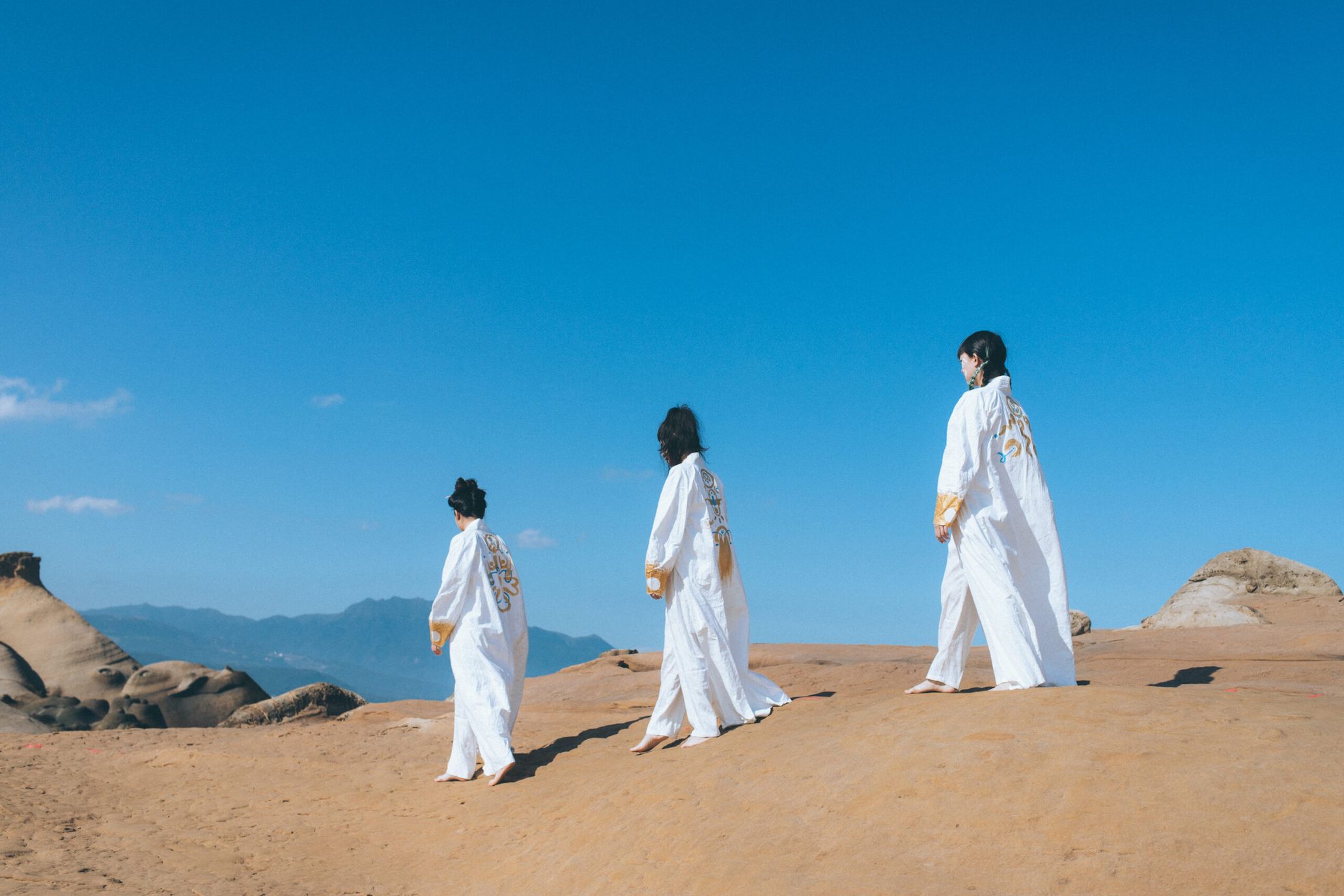
–It seems that you had the world stage in mind since the beginning, with you going on tour in England after the release of your EP in 2017 and recording a split album with Taiwanese band Crocodelia. I imagine it’s hard to go on tour in England right after your first release, but how did that come about?
Fumie: I live in Taiwan, but I used to live in England before Kuunatic. I went there to study but started a booking agency with a friend. I was in charge of coordinating shows and tours for Japanese artists in Europe. My ties to Europe, especially England, are strong, and I wanted to perform abroad with the band. We made the England tour happen because of those connections.
Yuko: I was in an electronic duo before Kuunatic and once played at a European festival. It was so much fun, and my desire to perform abroad became stronger. I also work on solo projects outside of Kuunatic, and it seems like I have connections in Europe, so I play live there often. But it’s not like we were trying to only have a career outside of Japan because we were active in the country too.
Fumie: Because our music is so different, we didn’t feel like we belonged to a particular scene, we used to host events at Forestlimit in Hatagaya and Soup in Ochiai. We also performed at shows we got invited to. It was like we naturally got sucked into Europe after we did this and that.
–Shoko-san, you currently live in London, yes?
Shoko: I used to go on tour in the UK every year, so I was familiar with the city. I finally got the visa I had wanted since I was a student last year during the pandemic, so I moved here. I can play shows and go on tour more flexibly. Before I joined Kuunatic, I played at open mics in London as a solo singer-songwriter, and Fumi-chan helped me a lot. I started having a real career abroad after I joined the band.
Illustrating the rebirth of a destroyed world with Gate of Klüna
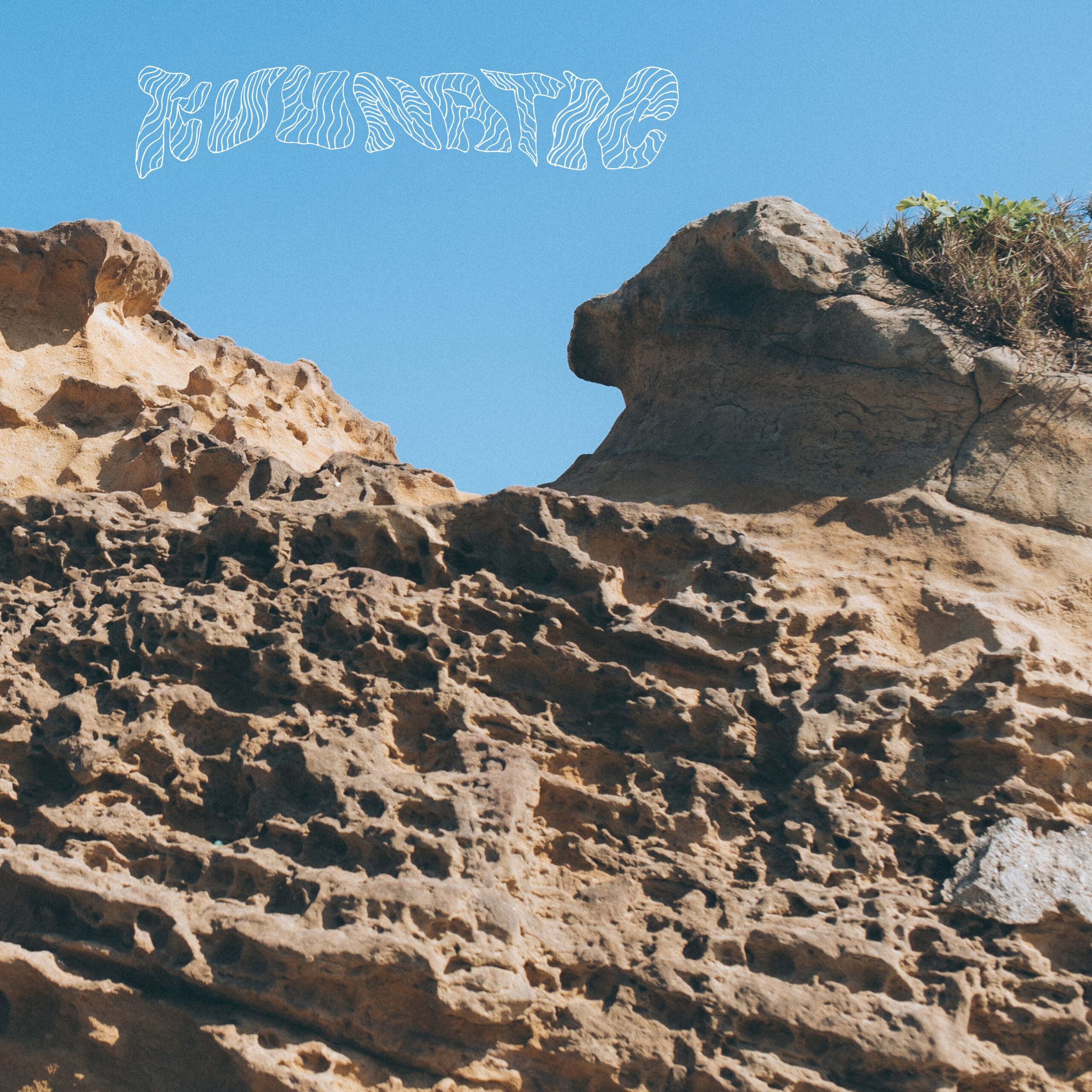
—Tim DeWit, the former member of Gang Gang Dance, produced Gate of Klüna, which was released last October. How did you meet him?
Fumie: After I moved to Taiwan, I had the opportunity to DJ at a festival, and Tim was there too. My friend introduced me to him. At first, I didn’t know he was part of Gang Gang Dance, and I just talked to him casually.
–How long ago was that?
Fumie: 2018. When I told him about our work and concept, he understood right away. He mentioned that he mixed and produced music, but I discovered he used to be in Gang Gang Dance afterward. I didn’t think he would be in Taiwan, so I was so surprised. During that time, we were getting ready to make Gate of Klüna and were talking about how it would be nice to have a producer for the album. I spoke to the band members about meeting Tim, and we all had the same opinion. We were like, “If we ask Tim to produce it, he might bring interesting ideas to the table.” That’s why we asked him to do it.
–What did you think about the idea of Tim producing the album, Yuko-san?
Yuko: As a solo artist, Tim’s more of an electronic artist who makes electronic albums. I felt we could create a miracle or an unprecedented album because of the blend of different elements. And the result was brilliant. Kuunatic started with the concept of us playing an instrument we’d never played before. Our ensemble had an amateurish aspect, but thanks to a professional like Tim being a part of the process, we created a coherent sound.
–What about you, Shoko-san?
Shoko: The best part was Tim’s desires and principles about making music as an artist. We all shared so many ideas and re-recorded the songs over and over. As Yuko-san mentioned, Tim is more of an electronic music type of person, but the first album of Gang Gang Dance has a tribal feel to it and encapsulates both genres. His ideas and unique perspective were inspiring; it was a memorable experience.
—Gate of Klüna was released through the German label Glitterbeat Records. How did that come to be?
Fumie: Glitterbeat is a label I’ve always loved, and I frequently check out their releases. When we finished our album, we reached out to them, and they responded, “It’s been so long since we got excited by listening to music.” We went back and forth, and the album release was arranged.
Yuko: I listen to their releases because I like them too. I was overjoyed when I heard they were going to release our album.
–I heard that the Gate of Klüna is based on a story inspired by ancient mythology. Could you talk about that?
Fumie: The world of the fourth song of Kuurandia, “Battle of Goddesses,” expanded as an overarching concept. Simply put, it’s about the end of the world brought on by Armageddon.
Yuko: Civilization and society go extinct because of the battle of goddesses.
Fumie: We all love the “end of the world” aesthetic in science fiction and fantasy. We chat a lot on tour, and science fiction and fantasy naturally become the topic of conversation. We talk about many different things whenever natural disasters like volcanic eruptions and earthquakes happen. Our music doesn’t have a direct message against climate change and other phenomena, but we get inspiration from the energy and danger of nature.
Back to the concept of the Gate of Klüna: the imagery is ancient. But because we live in the present, to talk about the distant past is to talk about the future. Based on the image of the ancient world making a return once society ends, we got inspiration from ancient history and weaved components of magic and tribal things. We created an original story and expressed that through sound.
–You depict a world where everything goes back to zero, and a new life and civilization come to life.
Fumie: Exactly. Our previous EP, Kuurandia, symbolizes a place meant for us, like a country or land. “Battle of Goddesses” illustrates how we’re rebuilding things because of the destruction caused by Armageddon. In the album, society ended around the Yayoi period in Japan.
–The song has the primitive energy of you trying to revive the world. It also gives off a ritualistic, shamanistic prayer vibe. Is shamanism part of your background?
Fumie: My mother is an actual shaman, so I have close ties to shamanism. Some parts of that song are in English, while others are in a language we made up, inspired by chants and sutras. I grew up listening to chants, so I feel like that’s reflected in our band.
Yuko: Much like the moon, we’re all drawn to shamanism.
–I see. Live shows are imperative for your band. What are your thoughts on playing live?
Yuko: It’s imperative. Feeling one with the audience is an irreplaceable feeling. There’s nothing like playing a live show with a live audience. It’s valuable.
Shoko: We all talked about that the other day. We’re inspired by shamanism and tribalism, and both things require a giving end and receiving end. That’s why live shows are so vital for us. I’ve given a virtual performance before, but it wasn’t the same. It’s hard to do it through a screen.
–What’s next in store for you?
Fumie: We have another European tour after our UK and EU tour in June and July. We’re also playing at a stage curated by Animal Collective at Le Guess Who?, a Dutch festival. I hope to record our next album, even though we’ll probably release it after next year.
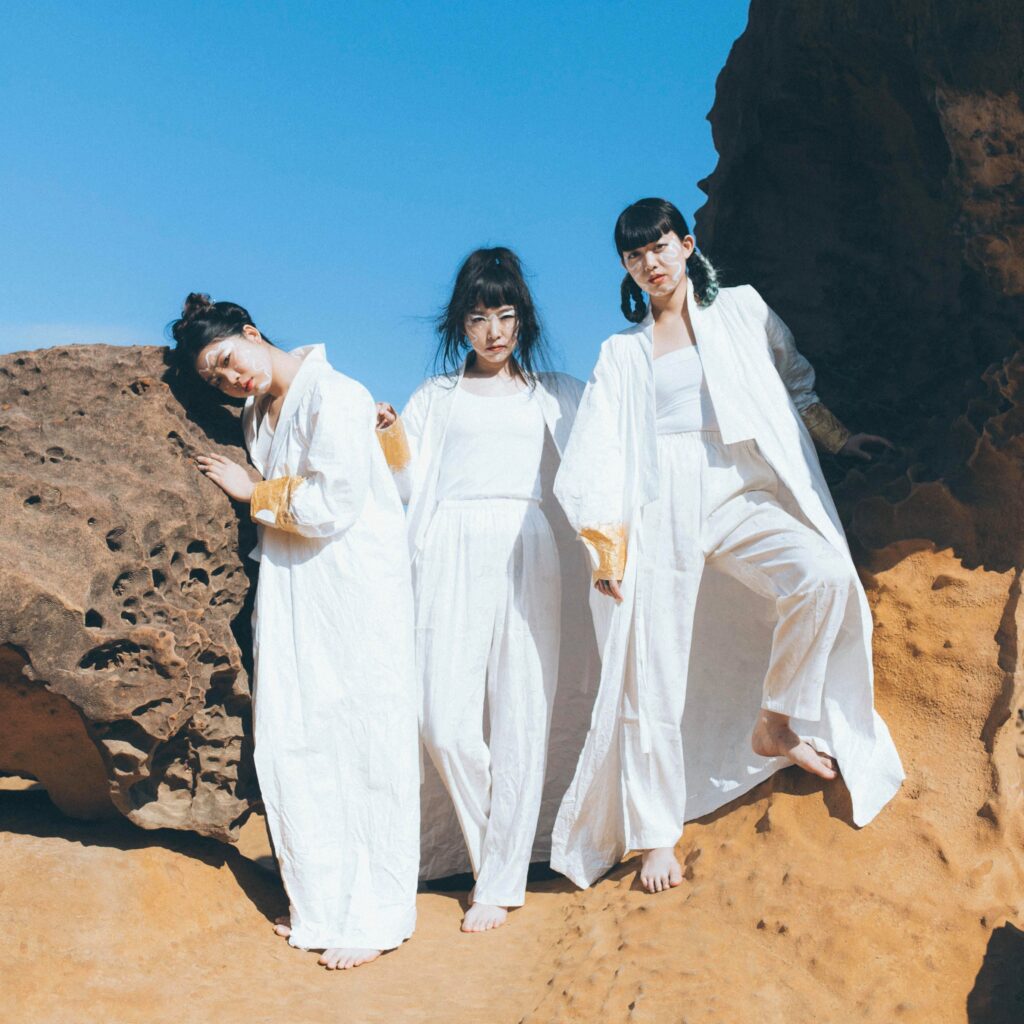
KUUNATIC
Kuunatic is a trio comprised of Fumie (keyboardist and vocalist), Yuko (drummer and vocalist), and Shoko (bassist and vocalist). They create a unique sound based on worshipping the moon and mythology. They released their first EP, Kuurandia, in 2017 and went on tour in the UK the same year. In 2018, they released a split EP with Taiwanese band, Crocodelia. In October 2021, they released their first LP, Gate of Klüna, through the German label Glitterbeat Records.
Twitter:@kuunatic
Instagram: @kuunatic
Cooperation Shunsuke Sasatani
Translation Lena Grace Suda
